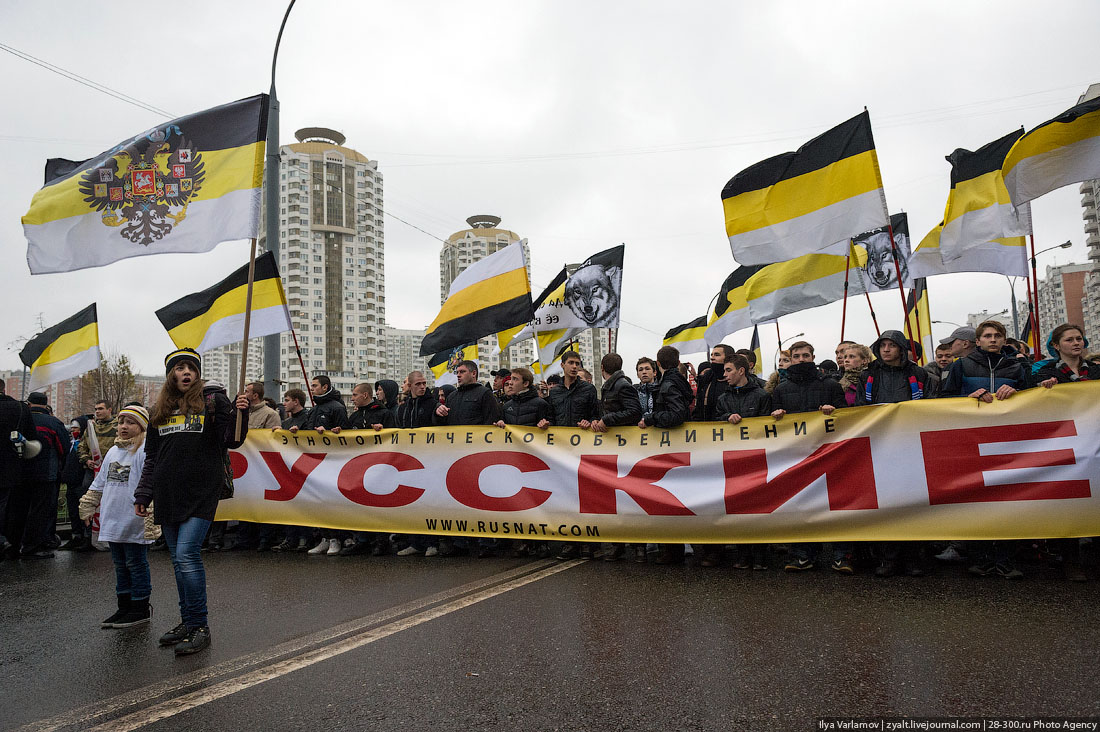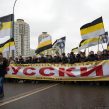
Belov and the Government’s Ban of ‘the Russians’
Publication: Eurasia Daily Monitor Volume: 12 Issue: 192
By:

A new milestone has passed in the trial of Alexander Belov, the outspoken former leader of the ultra-right Movement Against Illegal Immigration (DPNI) and a current member of the coordinating council for the Russian extreme nationalist opposition. The court completed its investigation, on September 8, and extended Belov’s house arrest for another year, until October 15, 2016. Belov is charged with violating articles of the Russian Criminal Code, specifically article 282 (incitement of national/ethnic hatred), article 280 (public incitement to extremist activity), article 282.1 (creation of an extremist organization), and article 174 (the legalization of funds obtained by criminal means). The last charge pertains to Belov’s original arrest at the Moscow hotel Intourist Kolomenskoye, in connection with the alleged embezzlement of $5 billion from banks in both Russia and Ukraine. Belov is also accused of violating Kazakhstani law for encouraging inter-nationality hatred in that former Soviet republic (Sova-center.ru, September 9). For his part, Belov claims that the charges are part of a vendetta against him for refusing to cooperate with the Federal Security Service (FSB) and discussing the Kazakhstani opposition. The pattern of detaining prominent nationalist leaders under house arrest fits with previous attempts by the regime in Moscow to suppress opposition groups of all stripes—as this was also the sentence leveled against famed anti-corruption blogger Alexei Navalny.
Extreme nationalists remain a prominent part of the Russian opposition, reflecting the fact that legitimate debates over the nature of Russian identity have continued without resolution since the fall of the Soviet Union. These debates over the “imagined community” of the nation play out prominently on Russian television (Stephen Hutchings and Vera Tolz, “Nation, Ethnicity, and Race on Russian Television,” Routledge, 2015). Scholars Stephen Hutchings and Vera Tolz view the televised coverage of political crises such as the Manezh ultra-nationalist riots in 2010 (see EDM, December 15, 2010) and the annexation of Crimea in 2014 as some of the most conspicuous manifestations of this debate in Russian society. Thus, by arresting Belov, the Russian government is striving to intervene in and guide this debate in a direction safer for the regime.
A related high-profile issue has been the ongoing Moscow city court case against the nationalist opposition organization “the Russians.” The group is accused of promoting an extremist agenda by calling for the Russian state to serve the interest of ethnic Russians first and foremost. The court case could also see the imperial (black-gold-white) flag—which is often brandished by extreme nationalist group in Russia—added to the federal list of extremist materials (Rusnat.com, October 5). In response, the organization has encouraged its supporters to protest outside the court; but it has apparently stopped short of organizing an official demonstration that would unite multiple groups in society. Even if the Moscow court does ban “the Russians” organization, however, the sentiments that motivate it will still remain and will go underground or perhaps take on a predominantly online identity.
Indeed, such extreme nationalist sentiments are manifest in the now-annual “Russian March,” which takes place every November 4 in cities throughout Russia. The increasing popularity of the March demonstrates the breadth of support for exclusionary nationalist policies in the Russian Federation. Planning for the 2015 demonstration is already underway by far-right groups. Belov’s colleague in “The Russians,” Dmitry Demushkin (the leader of the now-banned neo-Nazi organization Slavyansky Soiuz (Slavic Union), and himself recently convicted of promoting extremism at an event to celebrate Adolf Hitler’s birthday on April 20), told the media that an application for up to 15,000 people to march around Lublino district had been lodged with the authorities. Lublino is a working-class district of Moscow, populated mostly by ethnic Slavs who resent foreign and non-ethnic-Russian migrants taking unskilled jobs. The same application includes plans for a concert for 10,000 people afterwards (Rmarsh.info, October 8). The court ruling’s decision on banning the black-gold-white imperial flag could render the November 4 March problematic, as the flag is a key symbol for those who participate on it.
Plans for simultaneous marches throughout the Russian Federation are also under discussion. Last year, as the Russian March’s organizers argued, “despite unprecedented levels of political repression, provocation, and counter-propaganda from anti-Russian forces,” the March took place in 34 cities across the Russian Federation, including Moscow, Barnaul, Astrakhan, Belgorod, Vladivostok, Vologda, Ekaterinburg, Kaliningrad, Nizhny Novgorod, Lipetsk, Omsk, Perm, Penza, Pskov, Ryazan, Samara, St. Petersburg, Surgut, Syktyvkar, Tver, Tula, Ulyanovsk, and Khabarovsk (Rmarsh.info, November 5, 2014). The marchers called for peace with Ukraine (styled as “peace between the Slavic nations”) and outright opposition to the “thieves and swindlers” in the Kremlin. All indications are that this year’s Russian March will attract a similar or higher level of support throughout Russia—probably more, given Russia’s current economic crisis and impasse in Ukraine. Some analysts have raised the possibility that President Vladimir Putin’s venture in Syria is, in part, a bid to revive Russians’ pride in the national strength of the country, which has come to be the basis of his legitimacy (AP, October 5; see EDM, May 11). But such propaganda attempts are challenged by events like the Russian March.
The organizing committee for the Russian March has decided that the slogans for use in the March this year will include “Russia is Europe,” “down with the Chekists,” “for the rights and freedom of the Russian nation,” “no to dictators” and “freedom to Alexander Belov” (Rmarsh.info, October 7). The looming danger, of course, is that the longer the government ignores or tries to suppress the problems and concerns of this radical opposition movement, the more explosive its demands on (and actions against) the Russian state may eventually become.




